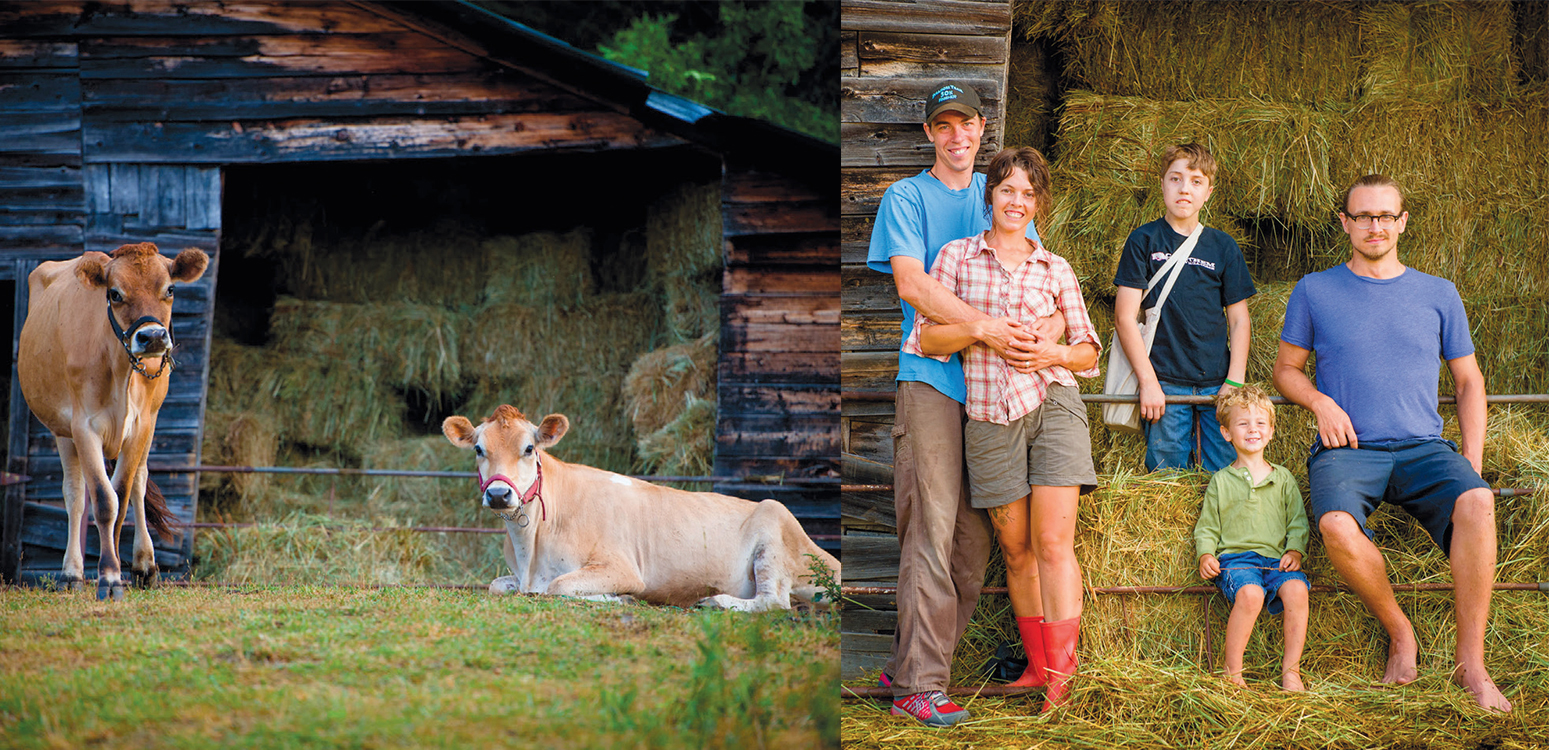Got {raw} Milk?
with contributions by K.C. Tucker and Kristy Boehler.
Americans are accustomed to buying milk in grocery stores. Jugs line the aisles uniformly in the dairy cases, and our choices range from whole milk to skim to kid-friendly flavors like chocolate and strawberry. For more than a decade, though, a growing group of Americans has been calling for another choice: raw milk.
Arkansas recently joined 32 other states where raw cow’s milk is an option for consumers. Until this year, sales of raw cow’s milk were illegal in Arkansas, though raw goat’s milk has been legal since 1995. On February 28, 2013, Rep. Randy Alexander (R-88) introduced House Bill 1536. The bill eventually passed both the House and Senate, and Governor Mike Beebe signed Act 1209 into law in April. The law allows Arkansas farmers to sell up to 500 gallons of raw cow’s or goat’s milk per month, and the farmer is allowed to set the price. The milk must be sold directly to consumers from the farm where the milk is produced, so it is not available commercially yet. Farmers must post signs on their land with their contact information and warnings for consumers that the milk has not been pasteurized nor inspected by the state. A similar warning must appear on a label on the milk packaging. Consumers have the right to inspect the cows and facilities where the milk is produced.
The battle for raw cow’s milk in Arkansas really took shape in the 2011 legislative session. The bill was narrowly defeated, and raw milk advocates began forming a campaign for the 2013 session. Rep. Alexander says that he was amazed by the response he had from all across the state when talk of a raw milk bill came up in this session. He researched the issue and felt strongly that allowing individual farmers to sell raw milk was both a health and a freedom issue. The health benefits to consumers, he says, far outweigh the potential risks.
One of the most vocal and persuasive advocates for raw milk sales has been Lee Richardson, former executive chef at Little Rock’s Capital Hotel. He testified before both the Senate and House Agriculture Committees in favor of legalizing raw milk this year. Richardson remembers his grandfather keeping a jug of “sour” milk in his refrigerator in the 1970s, but never knew why it was there. When he moved to Arkansas in 2006 he started to hear more about the local foods movement and about the issue of raw milk. It was then that he understood what his grandfather’s “sour” milk was, and he wanted the same healthy food and dairy options for his family, especially for his daughter.
Richardson’s focus as a chef is preserving food culture, or as he puts it, “creating an Arkansas identity in the national food story.” Raw milk is one important component of that. Beyond just the health issue, however, is his belief in citizens’ rights to choose whether or not to support a food production industry that is “about profit, not about feeding the body.” Alexander and many other local food advocates concur. They believe that consumers have the right to make informed food decisions of their own, not have them regulated by government entities.
Both Alexander and Richardson cite a lack of evidence that unpasteurized raw milk is a health risk. They are not alone. The Weston A. Price Foundation, a national nutrition education organization with local chapters in all 50 states, initiated the Campaign for Real Milk in 1999 to draw attention to the nutritional benefits of raw milk. The Foundation cites studies that show raw milk is good for our immune system and digestive tract, and it increases our absorption of other nutrients in our bodies. They also claim that pasteurization of milk kills many of its beneficial qualities.
Susan Anglin, co-owner with her husband, Ryan, of Anglin Dairy in Benton County, takes exception to the raw milk advocates’ claims. Anglin has been a dairy farmer for 28 years, and has a background in nursing as well. As the chair of the Arkansas Farm Bureau’s Dairy Commodities Division and a long-time dairy farmer, she testified before the state’s Senate Agriculture Committee in 2013 against the raw milk bill. She cites the many years of scientific research and extensive knowledge about the risks of contamination in raw milk and the benefits of pasteurizing it. Anglin asks, “Why would we forsake the knowledge we have for what is just a novel idea?”
The Centers for Disease Control and Prevention released a study in 2012 titled “Nonpasteurized Dairy Products, Disease Outbreaks, and State Laws—United States, 1993-2006,” in which they document 121 dairy-related outbreaks between 1993 and 2006, 73 of which involved nonpasteurized dairy products. The study indicates that 55 of the 73 outbreaks occurred in states that permit the sale of raw dairy products, and these outbreaks led to 202 hospitalizations and two deaths. The authors go on to recommend stronger restrictions of raw dairy sales pasteurization of all dairy products.
The U. S. Food and Drug Administration also clearly states on its website page, “The Dangers of Raw Milk: Unpasteurized Milk Can Pose a Serious Health Risk,” that unpasteurized milk carries dangerous pathogens that cause food-borne illnesses. The report goes on to say that pasteurized milk does not cause lactose intolerance or food allergies nor does it reduce the nutritional value of milk.
One of Anglin’s concerns about the availability of raw cow’s and goat’s milk is the lack of regulation or oversight. As noted above, Act 1209 only requires farmers selling raw milk to post warning signs to consumers that they are buying an unpasteurized product. As a farmer in the conventional dairy industry which is highly regulated, she wonders how consumers will know if they are buying a safe product that has been handled in clean and healthy conditions.
Act 1209 allows farmers to advertise their sale of raw milk. Area producers are now considering whether they will take up this new potential revenue source, and if they do, how they will market it in their communities. Summer Kitchen Family Farm is advertising their raw milk on Facebook and at the farmers markets where they are vendors, even though they cannot sell the milk at the markets. They had a long list of customers ready to buy from them when the law went into effect in July. Owners Mariah White and her husband, Ira, are excited about this opportunity to sell raw milk, in part because it means Arkansans have more food options, but also because it offers another source of income to area farmers.
Marie Shipp, another Ozarkansas farmer, currently milks three cows on her farm, producing about nine to ten gallons a day. She says she isn’t going to formally market her new product and is instead going to rely on word-of-mouth advertising. Shipp, like other raw milk advocates, says that she is happy about this new legislation and believes that the “government does not need to tell us what we can and cannot eat.”
People outside of the dairy industry or the local foods movement may be puzzled about the intensity of the raw milk debate. Even though unpasteurized dairy has come to the forefront of the food system debates currently taking place, politicians, food producers, scientists, and citizens have been arguing about it for more than a century. In the late 19th century, scientists discovered that outbreaks of numerous diseases were often related to bacteria found in unpasteurized milk as a result of poor hygiene, or in some cases were even passed from the cow to humans through the milk, as in the case of bovine tuberculosis. Philanthropist Nathan Straus, co-owner of Macy’s Department Store, took up the cause and established milk pasteurizing stations around the city of New York. These stations pasteurized milk on the spot and offered families hygiene advice. Child mortality rates dropped, and the spread of communicable diseases rapidly decreased. Similar stations were set up in other major American cities. While philanthropists and scientists cheered, the dairy industry balked. Milk producers claimed the cost of pasteurization was too high, and consumers were unaccustomed to this new flavor.
In 1908, Chicago passed the first mandatory dairy pasteurization law in the United States. New York City attempted to do so in 1907, but the initiative failed because the opposition cited all the health benefits of pure milk. President Theodore Roosevelt even entered the fray by having his Public
Health Service investigate pasteurized milk. The Service reported in 1908 that pasteurization “saved lives” and did not affect the taste or nutritional benefits of milk. Milton Rosenau, the head of Roosevelt’s Public Health Service, called for the industrialization of the dairy industry in order to pasteurize milk on a large scale in his 1912 book, The Milk Question. However, it wasn’t until 1987 that the FDA mandated that all milk and milk products be pasteurized in their final package form. This also included banning all interstate commerce of raw milk.
For more than a century Americans have been arguing about milk, and we continue to demand access to more and diverse choices in our dairy sources. Now Arkansans have the option of raw milk again. More choices mean more opportunities for us to educate ourselves about our food and to examine our values about food choices.
Edible Ozarkansas would like to thank Mariah and Ira White of Summer Kitchen Family Farm for allowing us to illustrate a day in the life of a milk farmer through access to them and their lovely cows, Scarlett and Annalise.




